Organizational Behaviour Report: Tesco Plc Culture and Motivation
VerifiedAdded on 2022/12/09
|18
|3685
|188
Report
AI Summary
This report provides an in-depth analysis of organizational behaviour within Tesco Plc, examining its culture, communication strategies, and employee motivation techniques. The report begins with an executive summary and table of contents, followed by an introduction to the study of organizational behaviour and its application to Tesco. The main body delves into identifying Tesco's culture using theoretical models such as Charles Handy's culture theory and Hofstede's model of organizational culture. The report then explores how Tesco's organizational culture enhances its effectiveness, particularly focusing on communication strategies, supported by primary and secondary research, including survey data and interview results. The report evaluates the role of culture in employee motivation, incorporating primary research findings based on Maslow's hierarchy of needs, and secondary research. Finally, the report assesses how Tesco could leverage its culture to further enhance its success, concluding with a summary of findings and a list of references. Appendices containing additional data are also included.
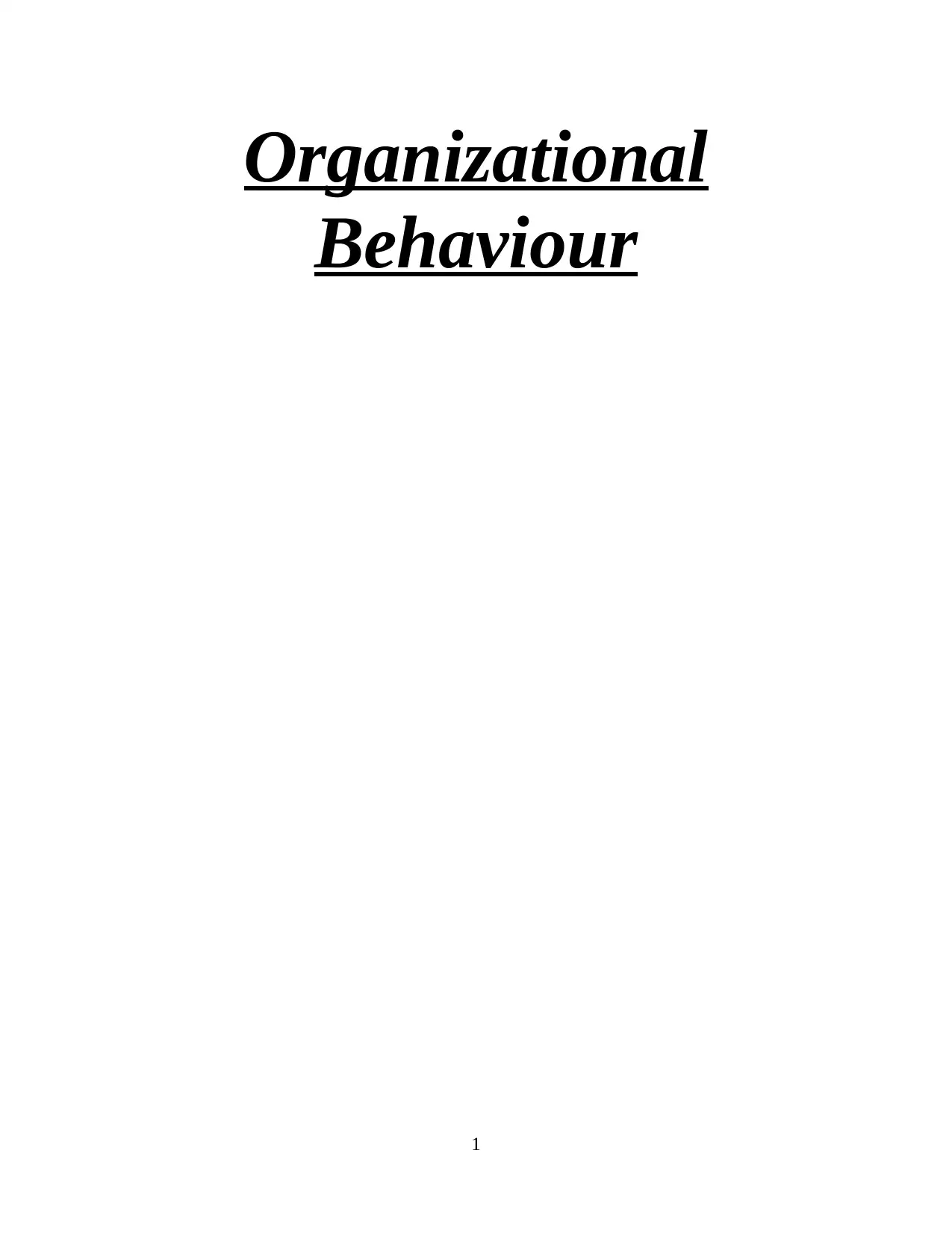
Organizational
Behaviour
1
Behaviour
1
Paraphrase This Document
Need a fresh take? Get an instant paraphrase of this document with our AI Paraphraser
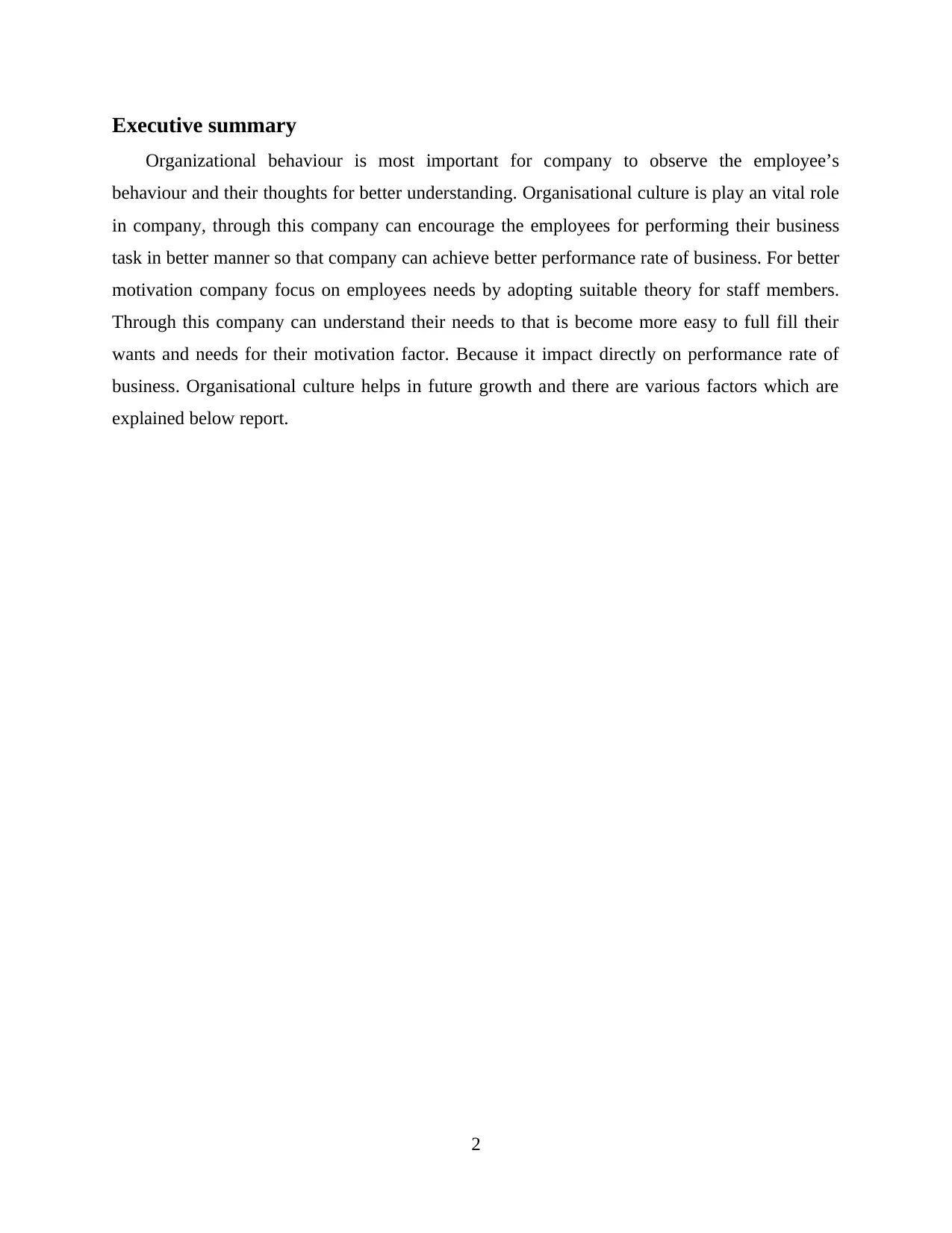
Executive summary
Organizational behaviour is most important for company to observe the employee’s
behaviour and their thoughts for better understanding. Organisational culture is play an vital role
in company, through this company can encourage the employees for performing their business
task in better manner so that company can achieve better performance rate of business. For better
motivation company focus on employees needs by adopting suitable theory for staff members.
Through this company can understand their needs to that is become more easy to full fill their
wants and needs for their motivation factor. Because it impact directly on performance rate of
business. Organisational culture helps in future growth and there are various factors which are
explained below report.
2
Organizational behaviour is most important for company to observe the employee’s
behaviour and their thoughts for better understanding. Organisational culture is play an vital role
in company, through this company can encourage the employees for performing their business
task in better manner so that company can achieve better performance rate of business. For better
motivation company focus on employees needs by adopting suitable theory for staff members.
Through this company can understand their needs to that is become more easy to full fill their
wants and needs for their motivation factor. Because it impact directly on performance rate of
business. Organisational culture helps in future growth and there are various factors which are
explained below report.
2
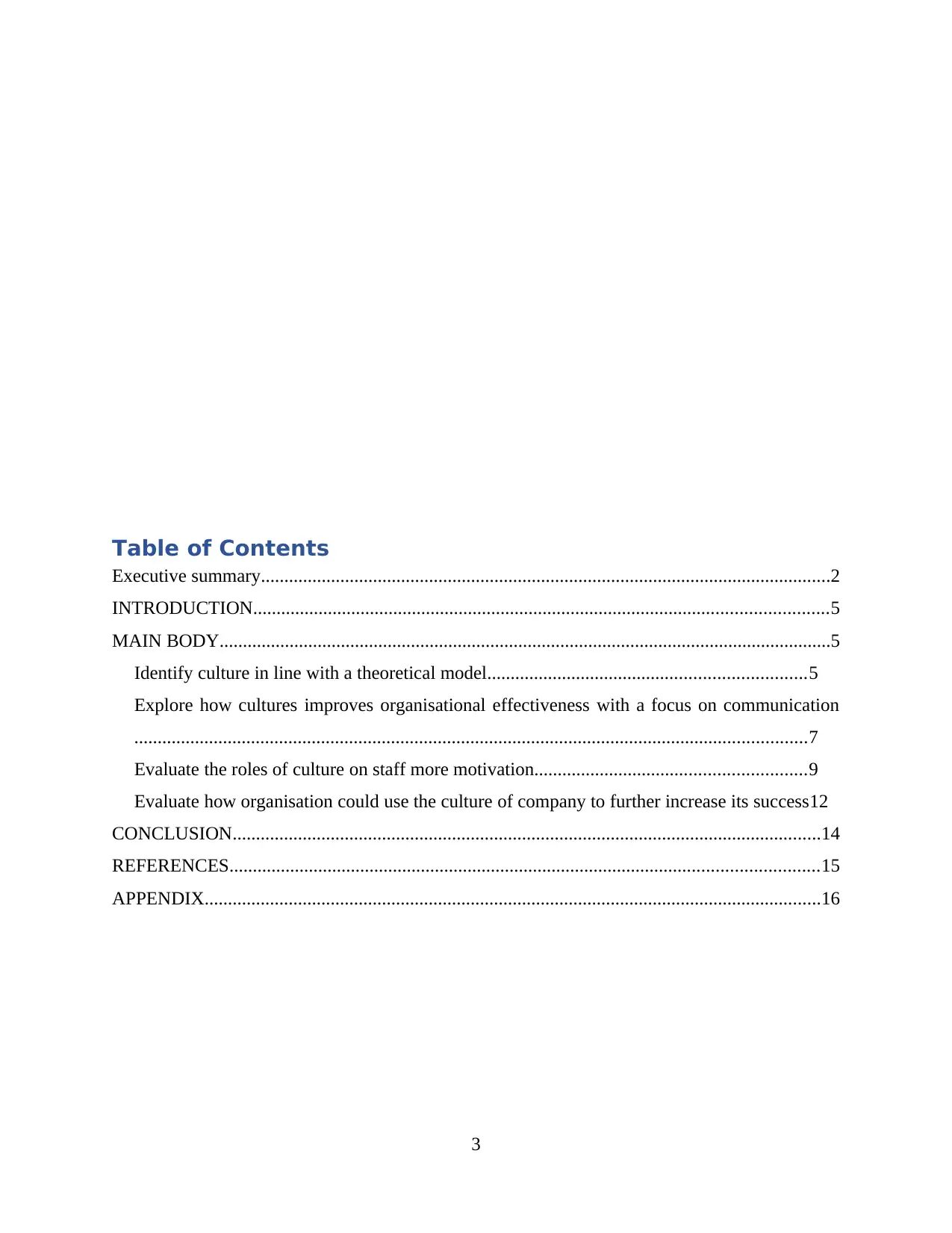
Table of Contents
Executive summary..........................................................................................................................2
INTRODUCTION...........................................................................................................................5
MAIN BODY...................................................................................................................................5
Identify culture in line with a theoretical model....................................................................5
Explore how cultures improves organisational effectiveness with a focus on communication
................................................................................................................................................7
Evaluate the roles of culture on staff more motivation..........................................................9
Evaluate how organisation could use the culture of company to further increase its success12
CONCLUSION..............................................................................................................................14
REFERENCES..............................................................................................................................15
APPENDIX....................................................................................................................................16
3
Executive summary..........................................................................................................................2
INTRODUCTION...........................................................................................................................5
MAIN BODY...................................................................................................................................5
Identify culture in line with a theoretical model....................................................................5
Explore how cultures improves organisational effectiveness with a focus on communication
................................................................................................................................................7
Evaluate the roles of culture on staff more motivation..........................................................9
Evaluate how organisation could use the culture of company to further increase its success12
CONCLUSION..............................................................................................................................14
REFERENCES..............................................................................................................................15
APPENDIX....................................................................................................................................16
3
⊘ This is a preview!⊘
Do you want full access?
Subscribe today to unlock all pages.

Trusted by 1+ million students worldwide

4
Paraphrase This Document
Need a fresh take? Get an instant paraphrase of this document with our AI Paraphraser
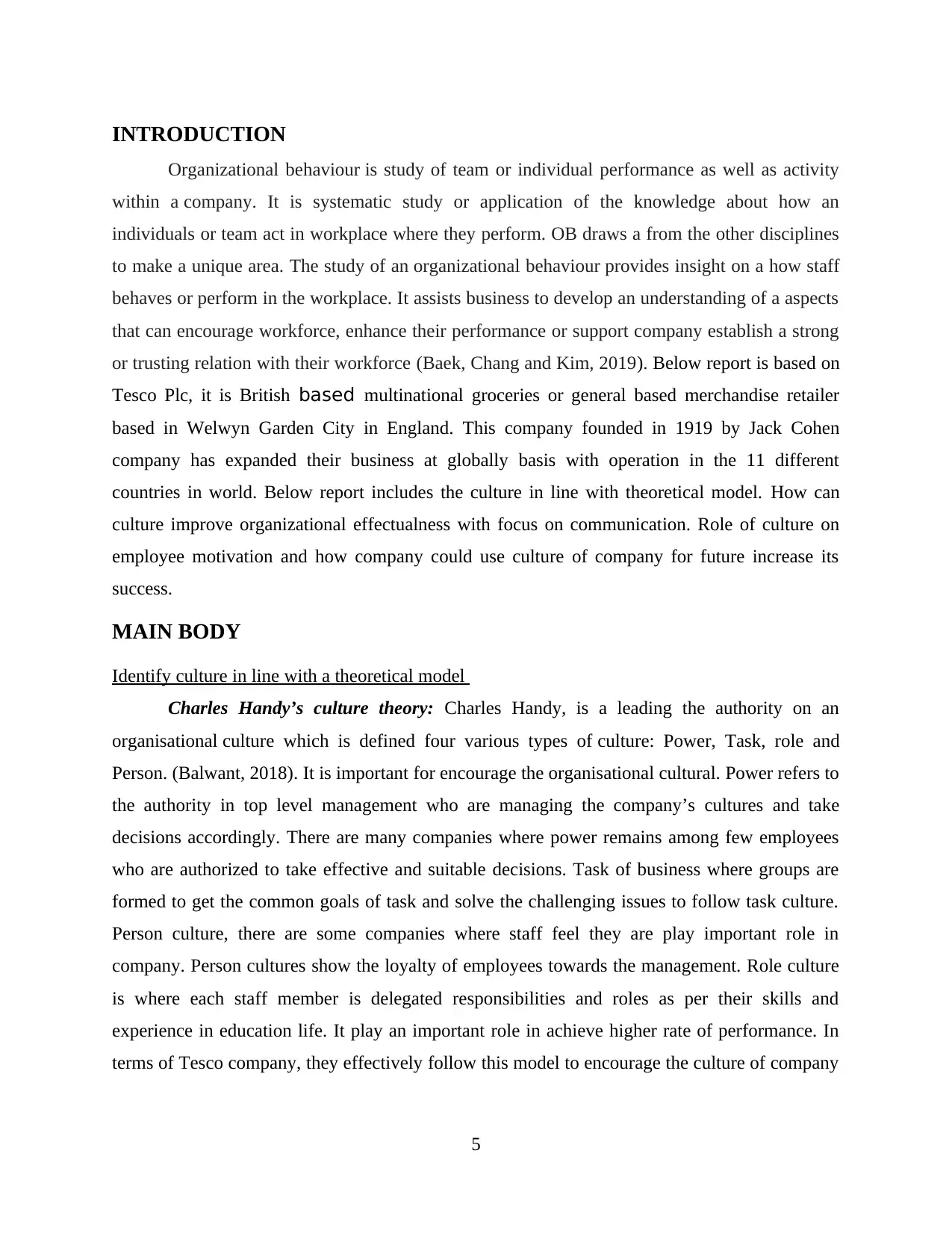
INTRODUCTION
Organizational behaviour is study of team or individual performance as well as activity
within a company. It is systematic study or application of the knowledge about how an
individuals or team act in workplace where they perform. OB draws a from the other disciplines
to make a unique area. The study of an organizational behaviour provides insight on a how staff
behaves or perform in the workplace. It assists business to develop an understanding of a aspects
that can encourage workforce, enhance their performance or support company establish a strong
or trusting relation with their workforce (Baek, Chang and Kim, 2019). Below report is based on
Tesco Plc, it is British based multinational groceries or general based merchandise retailer
based in Welwyn Garden City in England. This company founded in 1919 by Jack Cohen
company has expanded their business at globally basis with operation in the 11 different
countries in world. Below report includes the culture in line with theoretical model. How can
culture improve organizational effectualness with focus on communication. Role of culture on
employee motivation and how company could use culture of company for future increase its
success.
MAIN BODY
Identify culture in line with a theoretical model
Charles Handy’s culture theory: Charles Handy, is a leading the authority on an
organisational culture which is defined four various types of culture: Power, Task, role and
Person. (Balwant, 2018). It is important for encourage the organisational cultural. Power refers to
the authority in top level management who are managing the company’s cultures and take
decisions accordingly. There are many companies where power remains among few employees
who are authorized to take effective and suitable decisions. Task of business where groups are
formed to get the common goals of task and solve the challenging issues to follow task culture.
Person culture, there are some companies where staff feel they are play important role in
company. Person cultures show the loyalty of employees towards the management. Role culture
is where each staff member is delegated responsibilities and roles as per their skills and
experience in education life. It play an important role in achieve higher rate of performance. In
terms of Tesco company, they effectively follow this model to encourage the culture of company
5
Organizational behaviour is study of team or individual performance as well as activity
within a company. It is systematic study or application of the knowledge about how an
individuals or team act in workplace where they perform. OB draws a from the other disciplines
to make a unique area. The study of an organizational behaviour provides insight on a how staff
behaves or perform in the workplace. It assists business to develop an understanding of a aspects
that can encourage workforce, enhance their performance or support company establish a strong
or trusting relation with their workforce (Baek, Chang and Kim, 2019). Below report is based on
Tesco Plc, it is British based multinational groceries or general based merchandise retailer
based in Welwyn Garden City in England. This company founded in 1919 by Jack Cohen
company has expanded their business at globally basis with operation in the 11 different
countries in world. Below report includes the culture in line with theoretical model. How can
culture improve organizational effectualness with focus on communication. Role of culture on
employee motivation and how company could use culture of company for future increase its
success.
MAIN BODY
Identify culture in line with a theoretical model
Charles Handy’s culture theory: Charles Handy, is a leading the authority on an
organisational culture which is defined four various types of culture: Power, Task, role and
Person. (Balwant, 2018). It is important for encourage the organisational cultural. Power refers to
the authority in top level management who are managing the company’s cultures and take
decisions accordingly. There are many companies where power remains among few employees
who are authorized to take effective and suitable decisions. Task of business where groups are
formed to get the common goals of task and solve the challenging issues to follow task culture.
Person culture, there are some companies where staff feel they are play important role in
company. Person cultures show the loyalty of employees towards the management. Role culture
is where each staff member is delegated responsibilities and roles as per their skills and
experience in education life. It play an important role in achieve higher rate of performance. In
terms of Tesco company, they effectively follow this model to encourage the culture of company
5
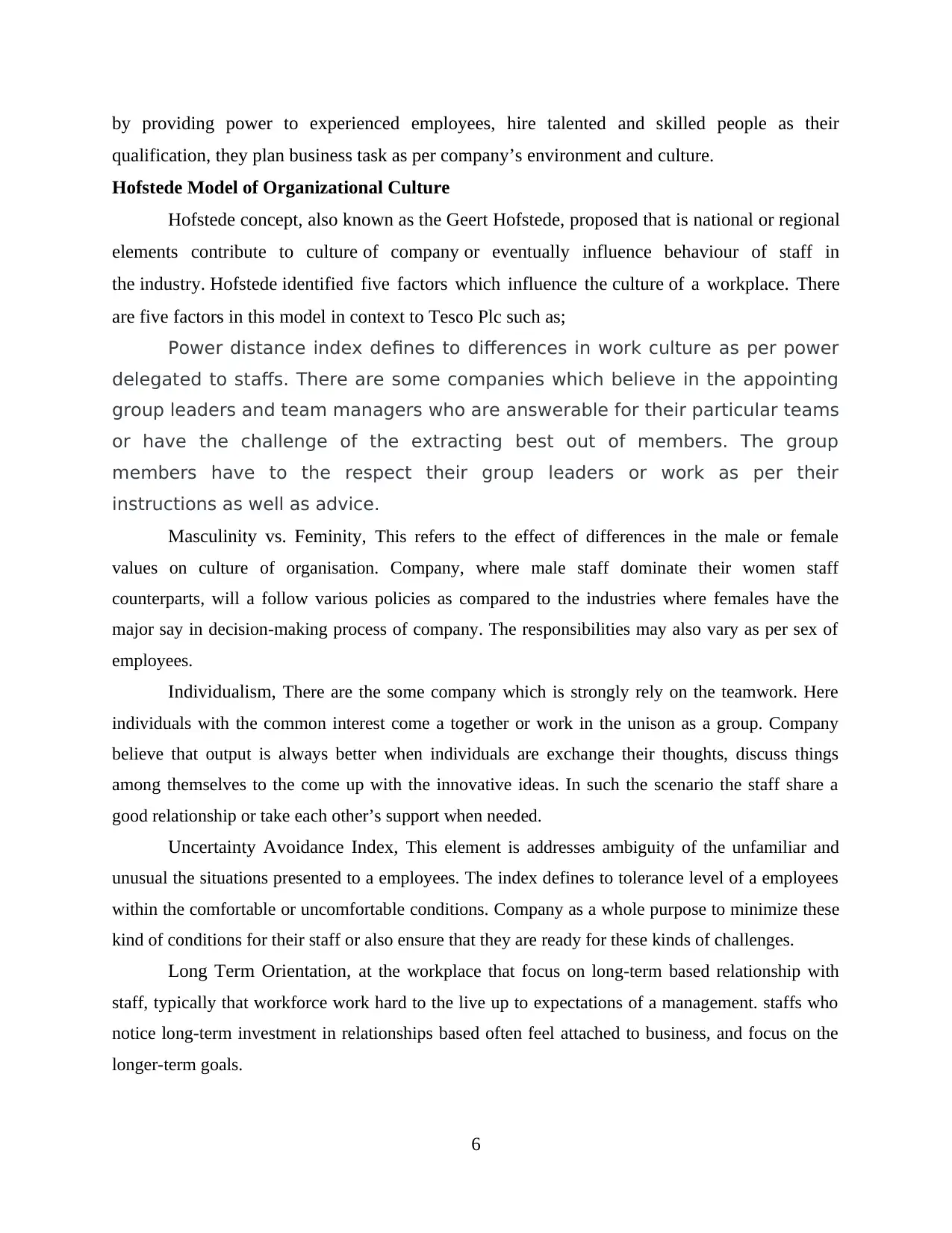
by providing power to experienced employees, hire talented and skilled people as their
qualification, they plan business task as per company’s environment and culture.
Hofstede Model of Organizational Culture
Hofstede concept, also known as the Geert Hofstede, proposed that is national or regional
elements contribute to culture of company or eventually influence behaviour of staff in
the industry. Hofstede identified five factors which influence the culture of a workplace. There
are five factors in this model in context to Tesco Plc such as;
Power distance index defines to differences in work culture as per power
delegated to staffs. There are some companies which believe in the appointing
group leaders and team managers who are answerable for their particular teams
or have the challenge of the extracting best out of members. The group
members have to the respect their group leaders or work as per their
instructions as well as advice.
Masculinity vs. Feminity, This refers to the effect of differences in the male or female
values on culture of organisation. Company, where male staff dominate their women staff
counterparts, will a follow various policies as compared to the industries where females have the
major say in decision-making process of company. The responsibilities may also vary as per sex of
employees.
Individualism, There are the some company which is strongly rely on the teamwork. Here
individuals with the common interest come a together or work in the unison as a group. Company
believe that output is always better when individuals are exchange their thoughts, discuss things
among themselves to the come up with the innovative ideas. In such the scenario the staff share a
good relationship or take each other’s support when needed.
Uncertainty Avoidance Index, This element is addresses ambiguity of the unfamiliar and
unusual the situations presented to a employees. The index defines to tolerance level of a employees
within the comfortable or uncomfortable conditions. Company as a whole purpose to minimize these
kind of conditions for their staff or also ensure that they are ready for these kinds of challenges.
Long Term Orientation, at the workplace that focus on long-term based relationship with
staff, typically that workforce work hard to the live up to expectations of a management. staffs who
notice long-term investment in relationships based often feel attached to business, and focus on the
longer-term goals.
6
qualification, they plan business task as per company’s environment and culture.
Hofstede Model of Organizational Culture
Hofstede concept, also known as the Geert Hofstede, proposed that is national or regional
elements contribute to culture of company or eventually influence behaviour of staff in
the industry. Hofstede identified five factors which influence the culture of a workplace. There
are five factors in this model in context to Tesco Plc such as;
Power distance index defines to differences in work culture as per power
delegated to staffs. There are some companies which believe in the appointing
group leaders and team managers who are answerable for their particular teams
or have the challenge of the extracting best out of members. The group
members have to the respect their group leaders or work as per their
instructions as well as advice.
Masculinity vs. Feminity, This refers to the effect of differences in the male or female
values on culture of organisation. Company, where male staff dominate their women staff
counterparts, will a follow various policies as compared to the industries where females have the
major say in decision-making process of company. The responsibilities may also vary as per sex of
employees.
Individualism, There are the some company which is strongly rely on the teamwork. Here
individuals with the common interest come a together or work in the unison as a group. Company
believe that output is always better when individuals are exchange their thoughts, discuss things
among themselves to the come up with the innovative ideas. In such the scenario the staff share a
good relationship or take each other’s support when needed.
Uncertainty Avoidance Index, This element is addresses ambiguity of the unfamiliar and
unusual the situations presented to a employees. The index defines to tolerance level of a employees
within the comfortable or uncomfortable conditions. Company as a whole purpose to minimize these
kind of conditions for their staff or also ensure that they are ready for these kinds of challenges.
Long Term Orientation, at the workplace that focus on long-term based relationship with
staff, typically that workforce work hard to the live up to expectations of a management. staffs who
notice long-term investment in relationships based often feel attached to business, and focus on the
longer-term goals.
6
⊘ This is a preview!⊘
Do you want full access?
Subscribe today to unlock all pages.

Trusted by 1+ million students worldwide
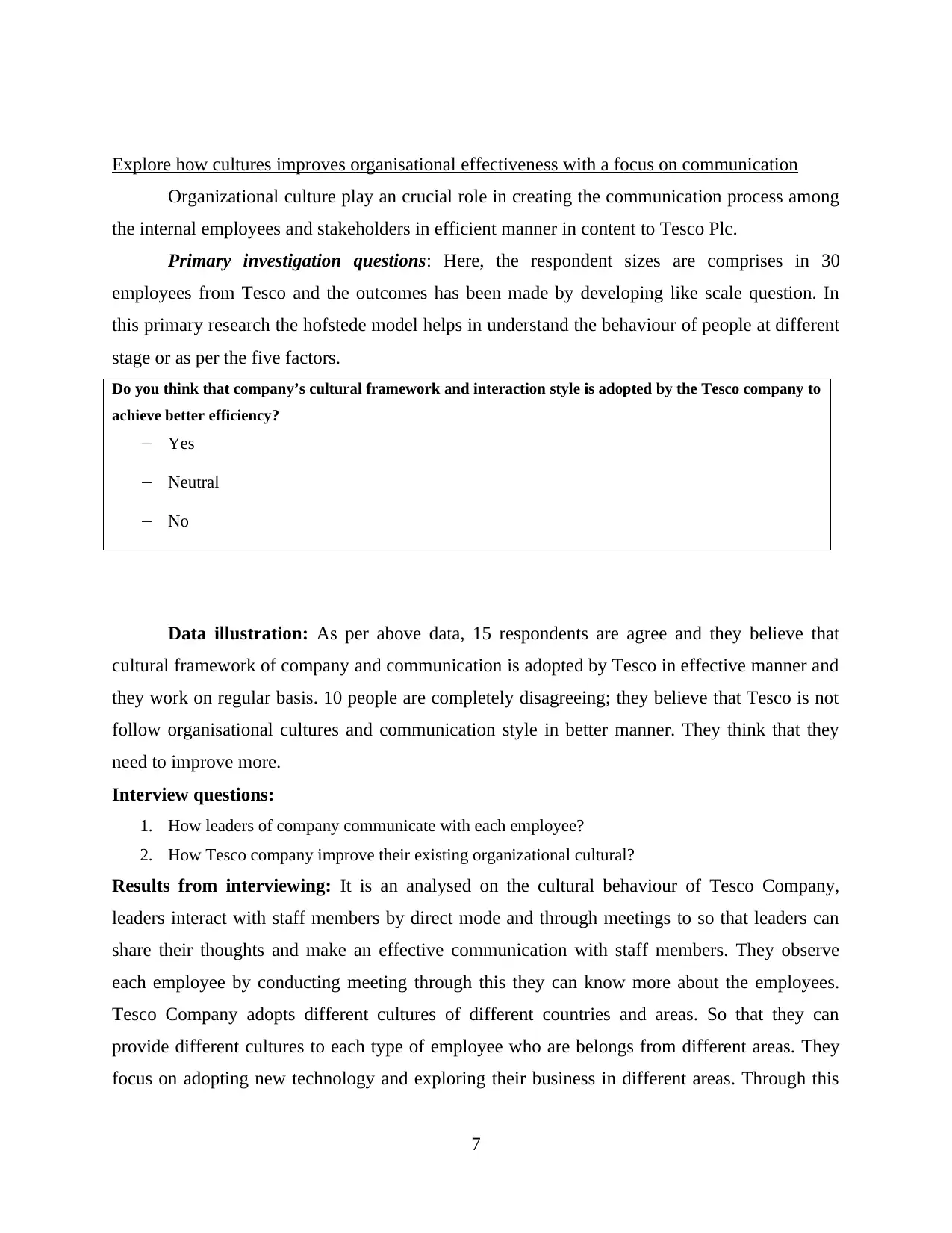
Explore how cultures improves organisational effectiveness with a focus on communication
Organizational culture play an crucial role in creating the communication process among
the internal employees and stakeholders in efficient manner in content to Tesco Plc.
Primary investigation questions: Here, the respondent sizes are comprises in 30
employees from Tesco and the outcomes has been made by developing like scale question. In
this primary research the hofstede model helps in understand the behaviour of people at different
stage or as per the five factors.
Do you think that company’s cultural framework and interaction style is adopted by the Tesco company to
achieve better efficiency?
Yes
Neutral
No
Data illustration: As per above data, 15 respondents are agree and they believe that
cultural framework of company and communication is adopted by Tesco in effective manner and
they work on regular basis. 10 people are completely disagreeing; they believe that Tesco is not
follow organisational cultures and communication style in better manner. They think that they
need to improve more.
Interview questions:
1. How leaders of company communicate with each employee?
2. How Tesco company improve their existing organizational cultural?
Results from interviewing: It is an analysed on the cultural behaviour of Tesco Company,
leaders interact with staff members by direct mode and through meetings to so that leaders can
share their thoughts and make an effective communication with staff members. They observe
each employee by conducting meeting through this they can know more about the employees.
Tesco Company adopts different cultures of different countries and areas. So that they can
provide different cultures to each type of employee who are belongs from different areas. They
focus on adopting new technology and exploring their business in different areas. Through this
7
Organizational culture play an crucial role in creating the communication process among
the internal employees and stakeholders in efficient manner in content to Tesco Plc.
Primary investigation questions: Here, the respondent sizes are comprises in 30
employees from Tesco and the outcomes has been made by developing like scale question. In
this primary research the hofstede model helps in understand the behaviour of people at different
stage or as per the five factors.
Do you think that company’s cultural framework and interaction style is adopted by the Tesco company to
achieve better efficiency?
Yes
Neutral
No
Data illustration: As per above data, 15 respondents are agree and they believe that
cultural framework of company and communication is adopted by Tesco in effective manner and
they work on regular basis. 10 people are completely disagreeing; they believe that Tesco is not
follow organisational cultures and communication style in better manner. They think that they
need to improve more.
Interview questions:
1. How leaders of company communicate with each employee?
2. How Tesco company improve their existing organizational cultural?
Results from interviewing: It is an analysed on the cultural behaviour of Tesco Company,
leaders interact with staff members by direct mode and through meetings to so that leaders can
share their thoughts and make an effective communication with staff members. They observe
each employee by conducting meeting through this they can know more about the employees.
Tesco Company adopts different cultures of different countries and areas. So that they can
provide different cultures to each type of employee who are belongs from different areas. They
focus on adopting new technology and exploring their business in different areas. Through this
7
Paraphrase This Document
Need a fresh take? Get an instant paraphrase of this document with our AI Paraphraser
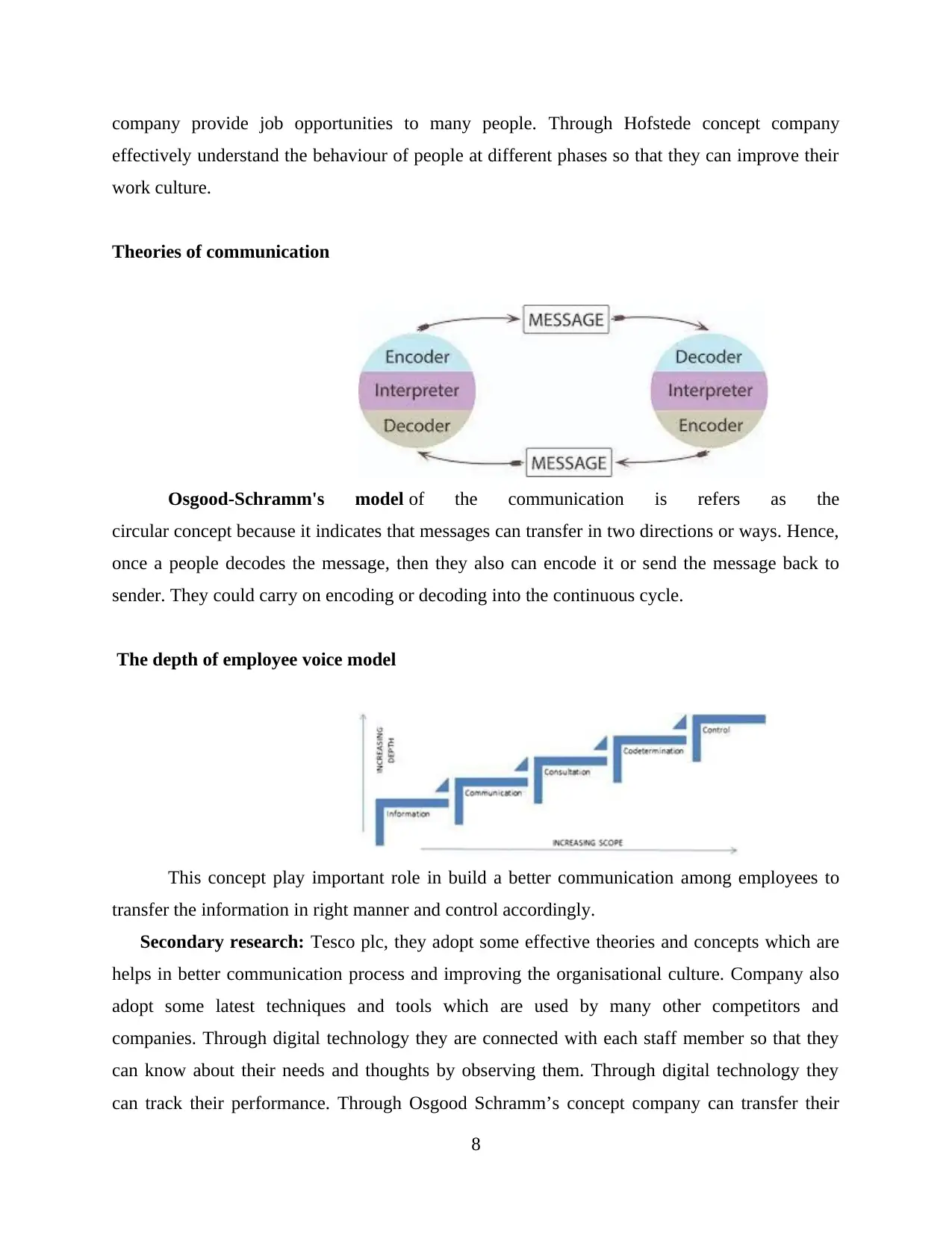
company provide job opportunities to many people. Through Hofstede concept company
effectively understand the behaviour of people at different phases so that they can improve their
work culture.
Theories of communication
Osgood-Schramm's model of the communication is refers as the
circular concept because it indicates that messages can transfer in two directions or ways. Hence,
once a people decodes the message, then they also can encode it or send the message back to
sender. They could carry on encoding or decoding into the continuous cycle.
The depth of employee voice model
This concept play important role in build a better communication among employees to
transfer the information in right manner and control accordingly.
Secondary research: Tesco plc, they adopt some effective theories and concepts which are
helps in better communication process and improving the organisational culture. Company also
adopt some latest techniques and tools which are used by many other competitors and
companies. Through digital technology they are connected with each staff member so that they
can know about their needs and thoughts by observing them. Through digital technology they
can track their performance. Through Osgood Schramm’s concept company can transfer their
8
effectively understand the behaviour of people at different phases so that they can improve their
work culture.
Theories of communication
Osgood-Schramm's model of the communication is refers as the
circular concept because it indicates that messages can transfer in two directions or ways. Hence,
once a people decodes the message, then they also can encode it or send the message back to
sender. They could carry on encoding or decoding into the continuous cycle.
The depth of employee voice model
This concept play important role in build a better communication among employees to
transfer the information in right manner and control accordingly.
Secondary research: Tesco plc, they adopt some effective theories and concepts which are
helps in better communication process and improving the organisational culture. Company also
adopt some latest techniques and tools which are used by many other competitors and
companies. Through digital technology they are connected with each staff member so that they
can know about their needs and thoughts by observing them. Through digital technology they
can track their performance. Through Osgood Schramm’s concept company can transfer their
8
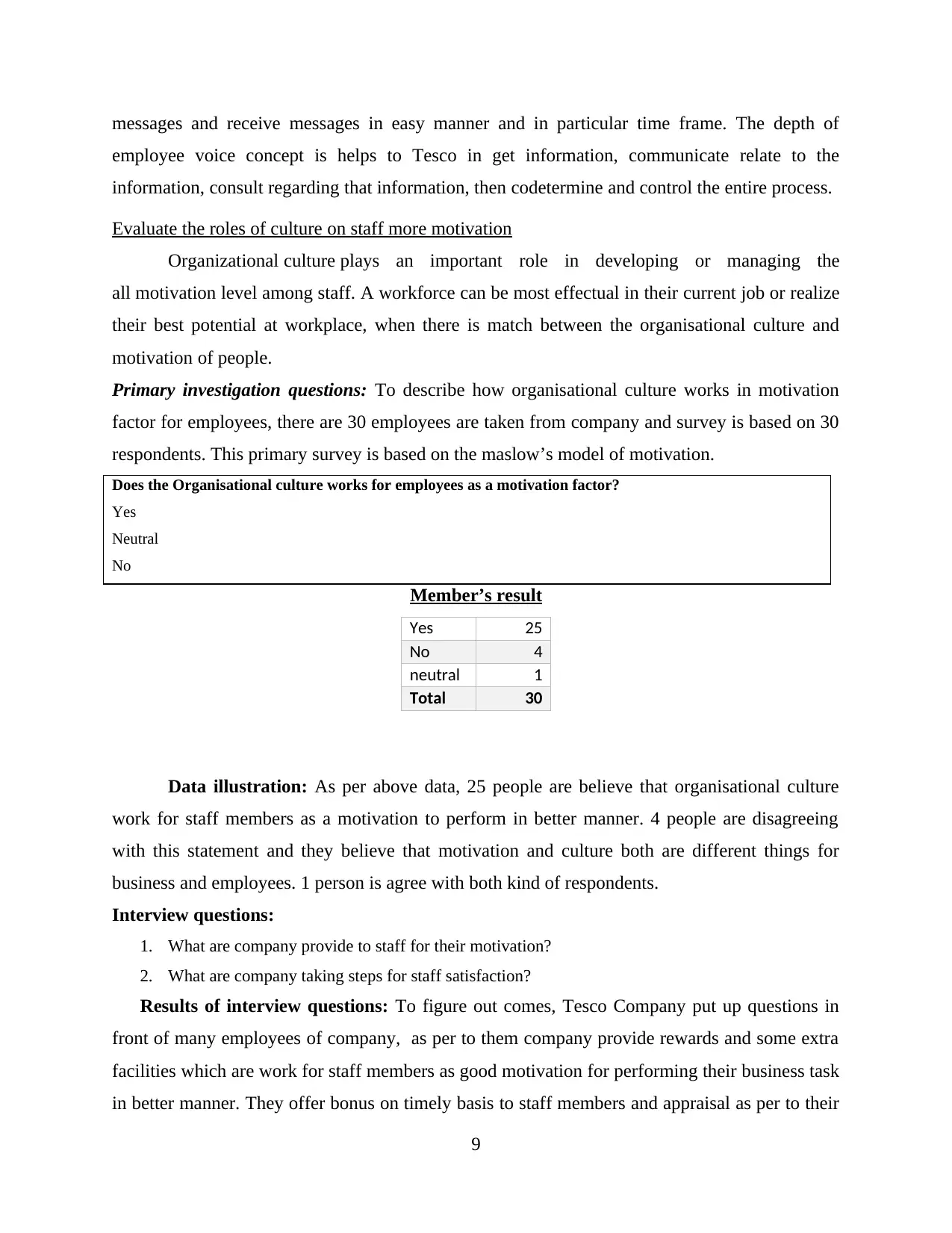
messages and receive messages in easy manner and in particular time frame. The depth of
employee voice concept is helps to Tesco in get information, communicate relate to the
information, consult regarding that information, then codetermine and control the entire process.
Evaluate the roles of culture on staff more motivation
Organizational culture plays an important role in developing or managing the
all motivation level among staff. A workforce can be most effectual in their current job or realize
their best potential at workplace, when there is match between the organisational culture and
motivation of people.
Primary investigation questions: To describe how organisational culture works in motivation
factor for employees, there are 30 employees are taken from company and survey is based on 30
respondents. This primary survey is based on the maslow’s model of motivation.
Does the Organisational culture works for employees as a motivation factor?
Yes
Neutral
No
Member’s result
Yes 25
No 4
neutral 1
Total 30
Data illustration: As per above data, 25 people are believe that organisational culture
work for staff members as a motivation to perform in better manner. 4 people are disagreeing
with this statement and they believe that motivation and culture both are different things for
business and employees. 1 person is agree with both kind of respondents.
Interview questions:
1. What are company provide to staff for their motivation?
2. What are company taking steps for staff satisfaction?
Results of interview questions: To figure out comes, Tesco Company put up questions in
front of many employees of company, as per to them company provide rewards and some extra
facilities which are work for staff members as good motivation for performing their business task
in better manner. They offer bonus on timely basis to staff members and appraisal as per to their
9
employee voice concept is helps to Tesco in get information, communicate relate to the
information, consult regarding that information, then codetermine and control the entire process.
Evaluate the roles of culture on staff more motivation
Organizational culture plays an important role in developing or managing the
all motivation level among staff. A workforce can be most effectual in their current job or realize
their best potential at workplace, when there is match between the organisational culture and
motivation of people.
Primary investigation questions: To describe how organisational culture works in motivation
factor for employees, there are 30 employees are taken from company and survey is based on 30
respondents. This primary survey is based on the maslow’s model of motivation.
Does the Organisational culture works for employees as a motivation factor?
Yes
Neutral
No
Member’s result
Yes 25
No 4
neutral 1
Total 30
Data illustration: As per above data, 25 people are believe that organisational culture
work for staff members as a motivation to perform in better manner. 4 people are disagreeing
with this statement and they believe that motivation and culture both are different things for
business and employees. 1 person is agree with both kind of respondents.
Interview questions:
1. What are company provide to staff for their motivation?
2. What are company taking steps for staff satisfaction?
Results of interview questions: To figure out comes, Tesco Company put up questions in
front of many employees of company, as per to them company provide rewards and some extra
facilities which are work for staff members as good motivation for performing their business task
in better manner. They offer bonus on timely basis to staff members and appraisal as per to their
9
⊘ This is a preview!⊘
Do you want full access?
Subscribe today to unlock all pages.

Trusted by 1+ million students worldwide
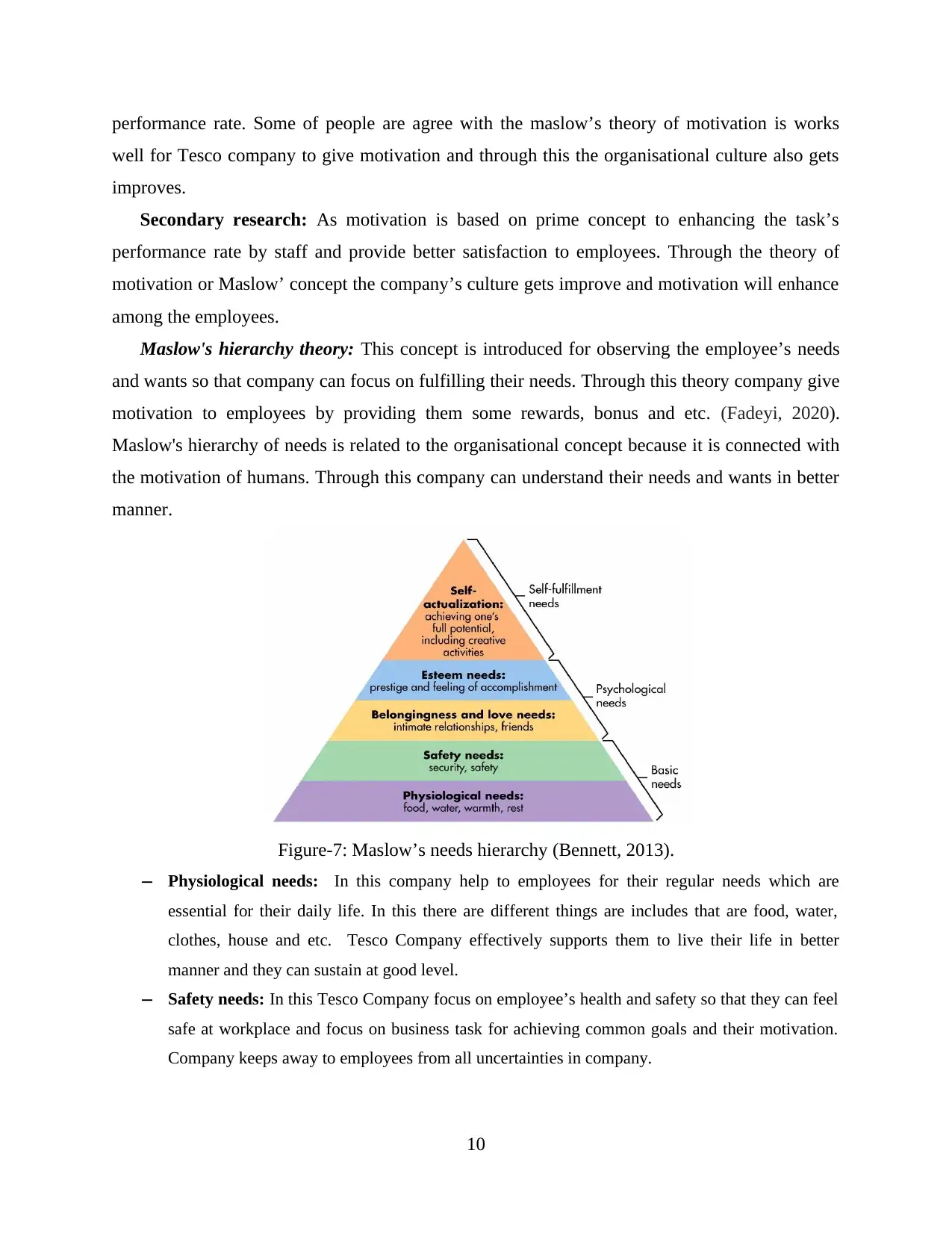
performance rate. Some of people are agree with the maslow’s theory of motivation is works
well for Tesco company to give motivation and through this the organisational culture also gets
improves.
Secondary research: As motivation is based on prime concept to enhancing the task’s
performance rate by staff and provide better satisfaction to employees. Through the theory of
motivation or Maslow’ concept the company’s culture gets improve and motivation will enhance
among the employees.
Maslow's hierarchy theory: This concept is introduced for observing the employee’s needs
and wants so that company can focus on fulfilling their needs. Through this theory company give
motivation to employees by providing them some rewards, bonus and etc. (Fadeyi, 2020).
Maslow's hierarchy of needs is related to the organisational concept because it is connected with
the motivation of humans. Through this company can understand their needs and wants in better
manner.
Figure-7: Maslow’s needs hierarchy (Bennett, 2013).
Physiological needs: In this company help to employees for their regular needs which are
essential for their daily life. In this there are different things are includes that are food, water,
clothes, house and etc. Tesco Company effectively supports them to live their life in better
manner and they can sustain at good level.
Safety needs: In this Tesco Company focus on employee’s health and safety so that they can feel
safe at workplace and focus on business task for achieving common goals and their motivation.
Company keeps away to employees from all uncertainties in company.
10
well for Tesco company to give motivation and through this the organisational culture also gets
improves.
Secondary research: As motivation is based on prime concept to enhancing the task’s
performance rate by staff and provide better satisfaction to employees. Through the theory of
motivation or Maslow’ concept the company’s culture gets improve and motivation will enhance
among the employees.
Maslow's hierarchy theory: This concept is introduced for observing the employee’s needs
and wants so that company can focus on fulfilling their needs. Through this theory company give
motivation to employees by providing them some rewards, bonus and etc. (Fadeyi, 2020).
Maslow's hierarchy of needs is related to the organisational concept because it is connected with
the motivation of humans. Through this company can understand their needs and wants in better
manner.
Figure-7: Maslow’s needs hierarchy (Bennett, 2013).
Physiological needs: In this company help to employees for their regular needs which are
essential for their daily life. In this there are different things are includes that are food, water,
clothes, house and etc. Tesco Company effectively supports them to live their life in better
manner and they can sustain at good level.
Safety needs: In this Tesco Company focus on employee’s health and safety so that they can feel
safe at workplace and focus on business task for achieving common goals and their motivation.
Company keeps away to employees from all uncertainties in company.
10
Paraphrase This Document
Need a fresh take? Get an instant paraphrase of this document with our AI Paraphraser
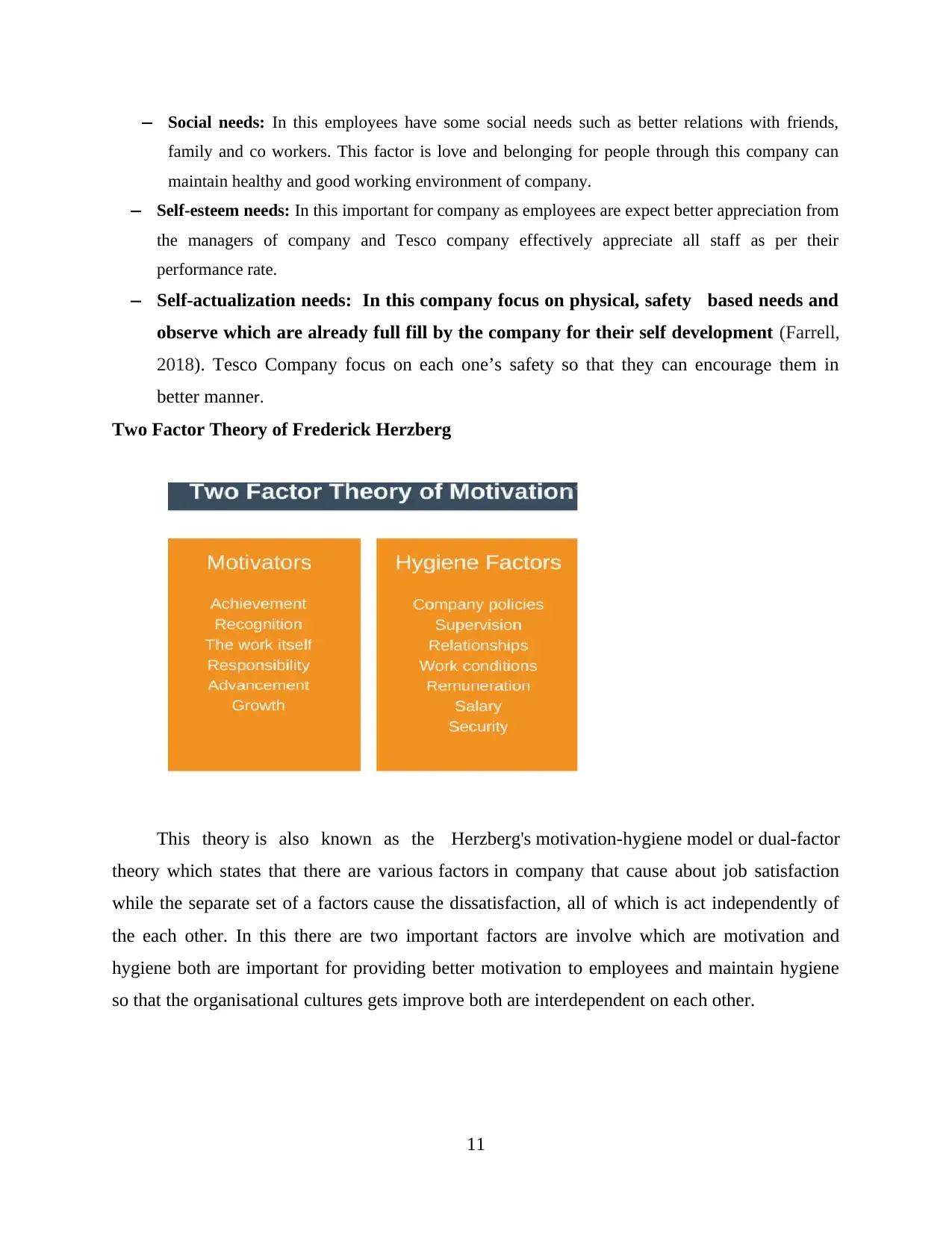
Social needs: In this employees have some social needs such as better relations with friends,
family and co workers. This factor is love and belonging for people through this company can
maintain healthy and good working environment of company.
Self-esteem needs: In this important for company as employees are expect better appreciation from
the managers of company and Tesco company effectively appreciate all staff as per their
performance rate.
Self-actualization needs: In this company focus on physical, safety based needs and
observe which are already full fill by the company for their self development (Farrell,
2018). Tesco Company focus on each one’s safety so that they can encourage them in
better manner.
Two Factor Theory of Frederick Herzberg
This theory is also known as the Herzberg's motivation-hygiene model or dual-factor
theory which states that there are various factors in company that cause about job satisfaction
while the separate set of a factors cause the dissatisfaction, all of which is act independently of
the each other. In this there are two important factors are involve which are motivation and
hygiene both are important for providing better motivation to employees and maintain hygiene
so that the organisational cultures gets improve both are interdependent on each other.
11
family and co workers. This factor is love and belonging for people through this company can
maintain healthy and good working environment of company.
Self-esteem needs: In this important for company as employees are expect better appreciation from
the managers of company and Tesco company effectively appreciate all staff as per their
performance rate.
Self-actualization needs: In this company focus on physical, safety based needs and
observe which are already full fill by the company for their self development (Farrell,
2018). Tesco Company focus on each one’s safety so that they can encourage them in
better manner.
Two Factor Theory of Frederick Herzberg
This theory is also known as the Herzberg's motivation-hygiene model or dual-factor
theory which states that there are various factors in company that cause about job satisfaction
while the separate set of a factors cause the dissatisfaction, all of which is act independently of
the each other. In this there are two important factors are involve which are motivation and
hygiene both are important for providing better motivation to employees and maintain hygiene
so that the organisational cultures gets improve both are interdependent on each other.
11
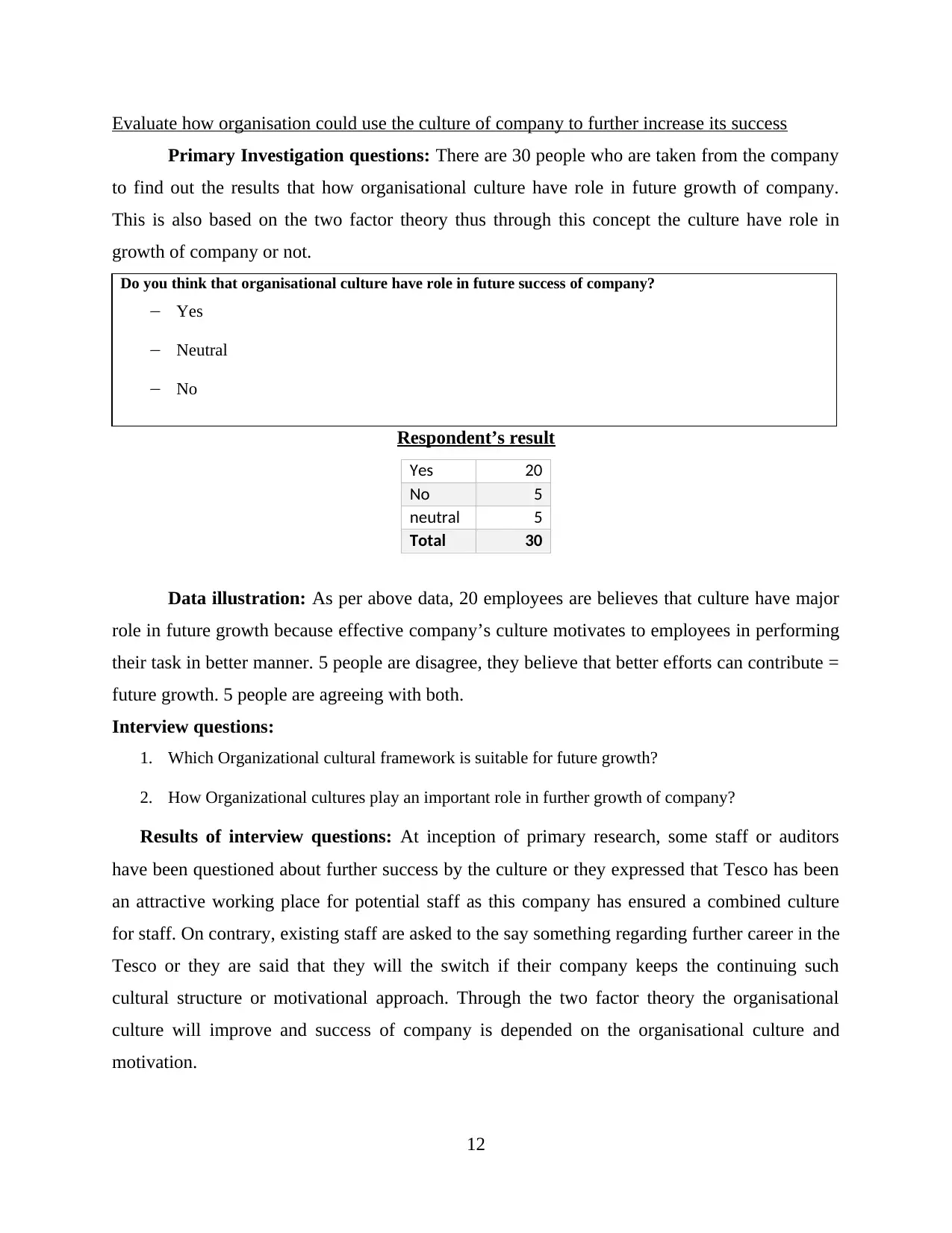
Evaluate how organisation could use the culture of company to further increase its success
Primary Investigation questions: There are 30 people who are taken from the company
to find out the results that how organisational culture have role in future growth of company.
This is also based on the two factor theory thus through this concept the culture have role in
growth of company or not.
Do you think that organisational culture have role in future success of company?
Yes
Neutral
No
Respondent’s result
Data illustration: As per above data, 20 employees are believes that culture have major
role in future growth because effective company’s culture motivates to employees in performing
their task in better manner. 5 people are disagree, they believe that better efforts can contribute =
future growth. 5 people are agreeing with both.
Interview questions:
1. Which Organizational cultural framework is suitable for future growth?
2. How Organizational cultures play an important role in further growth of company?
Results of interview questions: At inception of primary research, some staff or auditors
have been questioned about further success by the culture or they expressed that Tesco has been
an attractive working place for potential staff as this company has ensured a combined culture
for staff. On contrary, existing staff are asked to the say something regarding further career in the
Tesco or they are said that they will the switch if their company keeps the continuing such
cultural structure or motivational approach. Through the two factor theory the organisational
culture will improve and success of company is depended on the organisational culture and
motivation.
12
Yes 20
No 5
neutral 5
Total 30
Primary Investigation questions: There are 30 people who are taken from the company
to find out the results that how organisational culture have role in future growth of company.
This is also based on the two factor theory thus through this concept the culture have role in
growth of company or not.
Do you think that organisational culture have role in future success of company?
Yes
Neutral
No
Respondent’s result
Data illustration: As per above data, 20 employees are believes that culture have major
role in future growth because effective company’s culture motivates to employees in performing
their task in better manner. 5 people are disagree, they believe that better efforts can contribute =
future growth. 5 people are agreeing with both.
Interview questions:
1. Which Organizational cultural framework is suitable for future growth?
2. How Organizational cultures play an important role in further growth of company?
Results of interview questions: At inception of primary research, some staff or auditors
have been questioned about further success by the culture or they expressed that Tesco has been
an attractive working place for potential staff as this company has ensured a combined culture
for staff. On contrary, existing staff are asked to the say something regarding further career in the
Tesco or they are said that they will the switch if their company keeps the continuing such
cultural structure or motivational approach. Through the two factor theory the organisational
culture will improve and success of company is depended on the organisational culture and
motivation.
12
Yes 20
No 5
neutral 5
Total 30
⊘ This is a preview!⊘
Do you want full access?
Subscribe today to unlock all pages.

Trusted by 1+ million students worldwide
1 out of 18
Related Documents
Your All-in-One AI-Powered Toolkit for Academic Success.
+13062052269
info@desklib.com
Available 24*7 on WhatsApp / Email
![[object Object]](/_next/static/media/star-bottom.7253800d.svg)
Unlock your academic potential
Copyright © 2020–2026 A2Z Services. All Rights Reserved. Developed and managed by ZUCOL.




